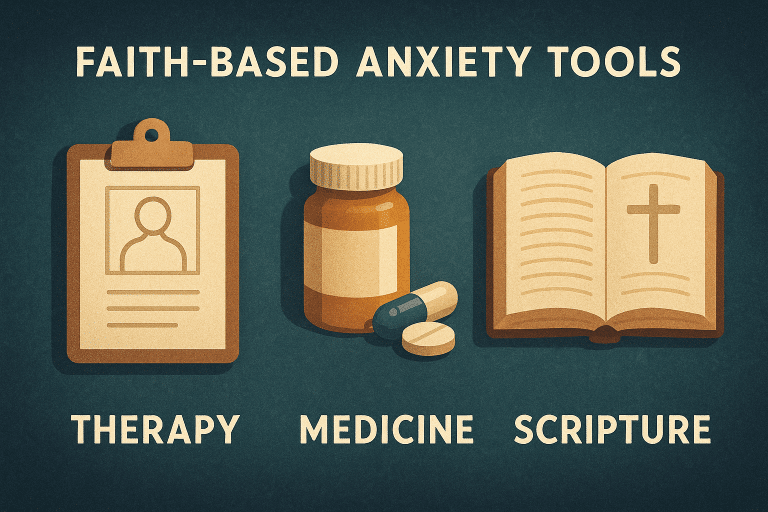Highly Sensitive Person Self‑Care Routines: A Faithful Guide
Estimated reading time: 6 minutes
As followers of Jesus, we often love deeply and notice what others miss. For many, that sensitivity feels like both a blessing and a burden. This guide turns that God‑given wiring into strength by laying out highly sensitive person self‑care routines you can practice daily for steadier peace, clearer focus, and durable joy.
Because Scripture commends wise rest and gentle hearts, we will ground every step in the Bible and in research. We also point you to internal resources such as Bible verses for anxiety and practical skills like deep breathing exercises. For clinical background on sensitivity and mental health, see the readable overview at Psychology Today, a meta‑analysis summarized by Neuroscience News, and nature‑connected flourishing reported in Frontiers in Psychology (NIH/PMC). When self‑care is not enough, evidence for SSRIs appears in this StatPearls medical review, and therapy suggestions tailored to HSPs are outlined by Kairos Wellness Collective.
Why Sensitivity Feels So Intense: Your Nervous System
First, your brain processes input deeply. In noisy rooms or bright spaces, your attention fires on many channels at once. Therefore, you tire faster and need more recovery. That is normal for a highly sensitive person. Research describes this wiring as sensory‑processing sensitivity, which highlights deeper cognitive processing and stronger emotional reactivity. For a concise primer, read this HSP basics article. Additionally, the meta‑analysis summarized here shows higher rates of anxiety and depression among highly sensitive people along with stronger response to positive environments and targeted interventions (summary).
Because stress lingers in sensitive bodies, build margins early. Start meetings a few minutes after the hour to pray. Choose softer light and lower media volume. Keep earplugs in your bag. Moreover, plan decompression windows after church or school. As you do, notice how your energy stays steadier and how your compassion remains available. For further spiritual framing, keep a shortlist of promises near you by bookmarking our internal guide to Bible verses for anxiety.

Biblically Grounded Self‑Care Basics For HSPs
Start with Sabbath. God gave rest as a gift, and sensitive people need it. Therefore, dedicate weekly downtime without guilt. Pair rest with nutrition, hydration, and consistent bedtime routines. Next, practice short breath prayers when anxiety rises—“Jesus, hold me now”—and repeat Philippians 4:6–7 until your breath slows. Additionally, use our guide to Christian meditation for anxiety to deepen attention and peace. Then add gentle movement. A ten‑minute walk outdoors often steadies your mood. Encouragingly, a mixed‑method study associates nature connectedness with greater flourishing for highly sensitive adults (Frontiers in Psychology).
After that, guard inputs. Choose gentler media, limit late‑night scrolling, and structure quiet, low‑clutter spaces. Also, invite a trusted friend to check in after demanding events. When emotions surge, name the feeling, breathe slowly, and ask God for perspective. Finally, keep a brief journal to capture triggers and small wins; this record will show progress and guide adjustments. When rumination loops, apply the biblical and practical tools in How to stop overthinking.
Daily Highly Sensitive Person Self‑Care Routines
Morning: Wake at a consistent time. Because bright screens can overstimulate, delay notifications and read a psalm first. Light stretching and five minutes of slow exhale breathing settle the vagus nerve. Afterwards, review a short list of priorities and block recovery breaks between tasks. Midday: When possible, eat whole foods, hydrate, and take a ten‑minute outdoor walk. If you commute, use earplugs or noise‑reducing headphones. Afternoon: Before returning home, pause in your car and pray. Consequently, you will enter the house calmer and kinder.
Evening: Dim lights one hour before bed, avoid heavy news, and journal two sentences of gratitude. Additionally, pair prayer with slow breathing using the skills in our deep breathing guide. Weekly: Plan a mini‑retreat with Scripture, a quiet hobby, or a park stroll. Additionally, simplify your calendar: say “not now” to extra commitments so you can say “yes” to what God calls you to do well. Monthly: Evaluate what drains or feeds you and adjust routines. Seasonally: Consider a 24‑hour digital Sabbath to reset attention.
Community, Therapy, And Medicine: Wise Help For HSP Self‑Care
Sometimes self‑care is not enough of a HSP self care routine. Accordingly, invite community: ask a mature friend to check your load and pray. If anxiety or depression persists, consult a licensed therapist. Cognitive‑behavioral methods and mindfulness strategies help many highly sensitive people; see this HSP‑focused overview (Kairos Wellness Collective). Likewise, medical care may be appropriate. Because SSRIs are first‑line for several anxiety and depressive disorders, discuss options with your clinician (StatPearls review). Prayer and medicine can cooperate; thoughtful treatment protects your capacity to love God and neighbor.
Faith and medicine do not compete. Therefore, you can pray for healing and use appropriate treatment as wise stewardship. During recovery, continue simple disciplines and celebrate small gains. Also, share your plan with family so home rhythms support quiet, sleep, and gentle mornings. For verses to steady your heart, keep our curated list of Bible verses for anxiety close at hand.

Amazon Tools That Support Highly Sensitive Person Self‑Care Routines
Because tools reduce friction, consider these trusted categories. Each link opens in a new tab and uses our affiliate ID.
- Noise‑reducing headphones: browse options
- Weighted blanket for body‑based calming: find a comfortable weight
- White noise machine for sleep: compare popular models
- Soft, low‑glare lighting: see warm‑tone lamps
- Blue‑light‑blocking glasses: reduce evening screen strain
- Journals and pens you enjoy: choose a simple notebook
- Earplugs for concerts and travel: pack a pair
- Aromatherapy diffuser and lavender: start a soothing habit
Conclusion: Gentle Rhythms For A Deeply Joyful Life
Because God designed you to notice, you can bless many. When you align routines with how your system works, peace returns and joy grows. Therefore, build margins, nurture sleep, practice prayerful breathing, and lean on wise help when needed. Additionally, use resources like prayer for anxiety and deep breathing exercises to keep momentum. Finally, keep adjusting with grace; sensitive souls flourish when life rhythms reflect how God made them.







